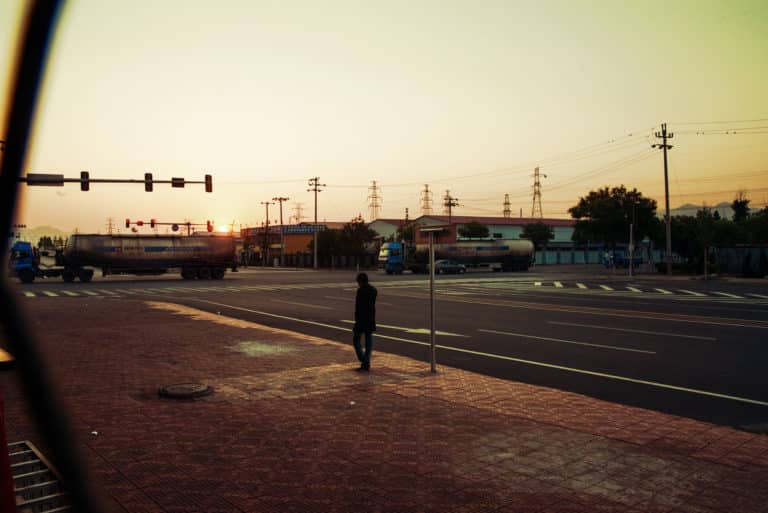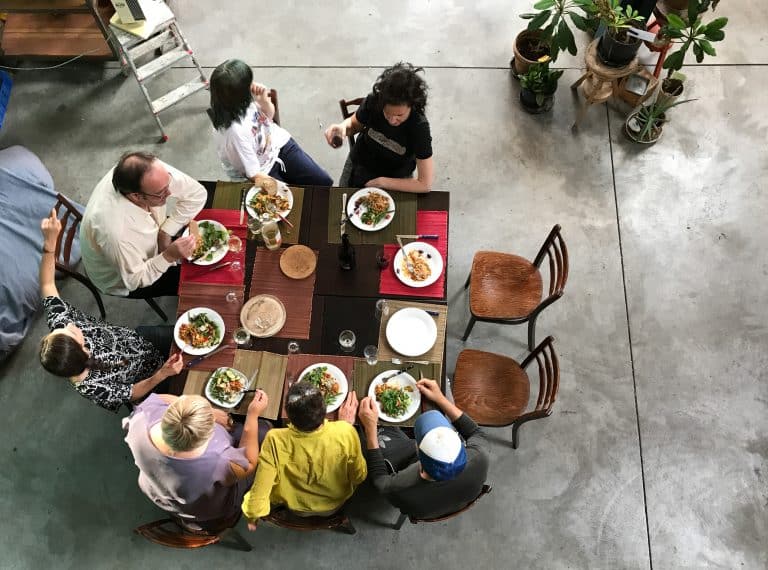
Image by Jonathan Kos-Read/Flickr, Attribution-NoDerivs.
Contemplative by Catastrophe
I was in my early thirties when I first felt drawn to the contemplative life. Inspired by reading Thomas Merton, the Trappist monk, I had visions of joining a monastic community. I thought the Abbey of Gethsemani, where Merton spent half his life, would be just right. Compared to Washington, D.C. — where I was caught up in the frenzy of community organizing — life at Gethsemani amid the wooded hills of Kentucky sounded idyllic.
Unfortunately, there were several major obstacles between monkhood and me. I was married, the father of three children, and had a job on which my family depended. I was also more Quaker than Catholic in my religious inclinations. Clearly, my “visions” of a monastic life were more like hallucinations. So instead of applying to Gethsemani, I ordered one of their famous fruitcakes, which are soaked and aged in fine Kentucky bourbon.
Fortified with fruitcake, I set off to find some way to live as a contemplative amid the world’s madness. Over the next few years, I read about the mystical stream that runs through all of the world’s wisdom traditions. I went on guided retreats and experimented with several popular contemplative practices. With the exception of Quaker Meeting for Worship, I couldn’t find a path compatible with my temperament and life situation.
Then came a breakthrough. It struck me that all forms of contemplation share the same goal: to help us see through the deceptions of self and world in order to get in touch with what Howard Thurman called “the genuine” within us and around us. Contemplation, I realized, need not be defined in terms of particular practices such as meditation, yoga, tai chi, or lectio divina. Instead, it can be defined in terms of its function: Contemplation is any way one has of penetrating illusion and touching reality.
That definition opened my eyes to myriad ways I might lead a contemplative life — as long as I keep trying to turn experience into insight. For example, facing into failure can help vaporize the illusions that keep me from seeing reality. When I succeed at something, I don’t spend much time wondering what I might learn from it. Instead, I congratulate myself on how clever I am, thus inflating my ego’s favorite illusion.
But, when failure bursts my ego-balloon, I spend long hours trying to understand what went wrong, often learning (or relearning) that the “what” is within me. Failure gives me a chance to touch hard truths about myself and my relation to the world that I evade when I’m basking in the glow of success and the illusions it breeds.
Life is full of challenges that can turn us into contemplatives. Years ago, I met Maureen, a single mom with a daughter named Rebecca. Rebecca had severe developmental disabilities and could do very little for herself. So Maureen had to live two lives, leaving her with neither the time nor the energy to go on retreat or take up formal spiritual practices. And yet I knew Maureen as a world-class contemplative.
In her love for Rebecca — who would never be “successful” or “useful” or “attractive” by conventional standards — Maureen had penetrated every cruel illusion our culture harbors about what makes a human being valuable. She had touched the reality that Rebecca was of profound value in and of herself, a being precious to the earth and a cherished child of God, as are we all.
Everyone who knew Maureen, including me, was touched by the contemplative quality of her presence. When you are with someone who values people not for what they do but for who they are, there’s no need to pretend or wear a mask. You experience the blessed relief that comes from needing to be nothing other than real.
Even the most devastating experiences can be doorways to contemplation.
So it has been for me in the wake of three bouts with clinical depression. Of course, while one is down there, in the darkness of the pit, there’s no chance to see anything as it really is. Everything is illusion, including the self-destructive “voice of depression” that insists that nothing short of death can solve your problems. But as one emerges, problems become manageable again, and everyday realities — a crimson glow on the morning horizon, a friend’s love, a stranger’s kindness, another precious day of life — present themselves as the treasures they truly are.
If contemplation is about penetrating illusion and touching reality, I wonder why we commiserate with others when they’ve had an experience that’s “disillusioned” them. “Oh, I’m so sorry,” we’ll say, “Please, let me comfort you.” Surely it would be better to say, “Congratulations! You’ve lost another illusion, which takes you closer to the solid ground of reality! Please, let me help disillusion you even further!”
I envy people who have whatever it takes to practice classic contemplative disciplines day in and day out, practices that help them get beyond the smoke and mirrors and see the truth about themselves and the world. I call these people “contemplatives by intention,” and some I’ve known seem to know how to get ahead of the train wreck. But I’m not a member of that blessed band.
I’m a “contemplative by catastrophe.” My wake-up calls generally come after the train wreck has happened and I’m trying to find my way out of the debris. I do not recommend this path as a conscious choice; it’s not necessarily what’s called a “good career move.” But if there’s anyone out there whose story is similar to mine, I come as the bearer of good news and glad tidings! Catastrophe, too, can be a contemplative path, as pitched and perilous as it may be.
I’m still on that path, and every day I await the next disillusionment to reveal whatever I need to know about myself and/or the world. Life can always be counted on to send something my way. Who knows what it will be this week? Maybe a reminder of something I regret from my past. Maybe a presidential primary debate and my response to it. Maybe a headline that convinces me once again that the human race has lost all semblance of soul.
Whatever it is, I’ll try to work my way through it until a hopeful reality is revealed on the other side. Regret can be turned into blessing. The mess we call American politics invites us to clean out the Augean stables and reclaim our democracy. When we feel certain that the human soul is no longer at work in the world, it’s time to make sure that ours is visible to someone, somewhere.
For whatever it’s worth, a few slices of Trappist fruitcake can help contemplation along. Works for me!
Author’s Note: On November 2, my friend and fellow columnist Sharon Salzberg posted a marvelous piece in this space, “The Irony of Attachment.” She told a story about the Dalai Lama receiving a gift of Trappist cheese while visiting the Abbey of Gethsemani, confessing to the monks that he wished they had given him a fruitcake instead. Sharon wrote, “A friend, hearing this story, commented that the Dalai Lama might be one of the few people on Earth who has longed for fruitcake.” I want His Holiness to know that he is not alone in this. Honesty compels me to note that this is the only way in which my life parallels his.


Share your reflection